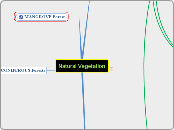Natural Vegetation
Tropical RAINFOREST
Tropical Equatorail Climate
10N & S of the Equator
Amazon Basin, Congo Basin, parts of SEA
High temp (abt 27C)
High r/f (>1500mm)
5 distinct layers
Emergent
30-50m
Crowns abv canopy
Tall, Straight, thick Trunks
Canopy
15-30m
wide,shallow,umbrella shaped crown
Forms con't leaf cover
Prevents sunlight frm penetrating
Plants
Epiphytes
Bird nest ferns, orchids
Grows on & use trees as physical support.
Rainwater & decaying leaves collected @ the joints of branched = water & food
Lianas
90m
Parasitic plants
Cause harm/death to host trees
Strangling fig
Wrap itself arnd trunk of host -> compete w/ the host for space, sunlight & nutrients
Understory
6-15m
Narrower, oval-shaped crowns
Grow whr gaps in the canopy allows sunlight to pass thru
Shrub
<6m
Tree saplings and woody plants
Undergrowth
<5m
v. little sunlight reaches this layer
Sparse
Grasses, Ferns, Mosses & fungi
Leaf litter
decompose-> humus->supports abundant vegetation growth
Features
Leaves
Broad
Max surface area for photosynthesis
Evergreen
Waxy w/ drip tips
Rainwater drain off easily
prevent harmful bacteria frm growing on them
prevents plants from diseases
Branch and Bark
Smooth and Thin
Branches only @ top 1/3 of trunk
Spread out like umbrella=> get as much sunlight as they can
Roots
Buttress Roots
Supposrts great wt of the tree
Shallow and spread widely
Fruits and Flowers
Brightly coloured
Produce fruits thruout the yr
IMPORTANCE
DEFORSTATION in Kalimantan
Causes
growing world's popn
more & more pple depend on the forest as a resource
dd for land ^^^
crowded places, esp cities
forests cleared to create more land for settlements, agri and industry
^^ in dd for agri landuse
indon govt popn resettlement prog to ease overcrowding in islands such as java and sumatra => many indons resettled in K
growth of settlements
improved transport networks
growth of industries
forests fires
Problems
Policies
Water Quantity
plays impt role in water cycle
maintain water supply
Central Catchment Nature Reserve in SG
Tropical MOONSOON forest
Features
Leaves
Deciduous
Shed leaves during dry season
minimise water loss thru transpiration
Leaves grow agn quickly during rainy season
Waxy with drip tips
Narrow
Bamboo
minimise loss of water thru transpiration
Roots
Deep roots
tap water sources deep underground as rf is not regular thruout the year
Bark and Branches
Thick & coarse
Protects trunk frm heat & dryness during dry season
Withstand extreme heat frm natural forest fires(occassionally)
Branches located arnd the middle of trunks
Fruits and Flowers
Many bear fruits duning dry season when they're leafless
Trees
mostly hardwoods
Commercially valuable ones incl, sandalwood, teak, sal
Tropical Moonsoon Climate
High temp(abt 26C)
High r/f (>1500mm)
Distinct wet & dry seasons
S.Asia, SEA, S. China, N. Aus
btween 10 & 25 N & S of the Equator
3 Layers
Canopy
25-30m
Plants
Understory
Abt 15m (6-15m)
Undergrowth
Bamboo thickts, grass
wet season-> dense
Dry season -> less dense
6m
MANGROVE Forest
Location
mainly tropical climate
Along sheltered coastal regions & places whr rivers constanly deposit clay & silt
23.5N & S of the Equator
Structure
Coastal zone
Nearest to the coast
flooded w/ salt water
adapted to growing in brackish water
Avicennia & sonneratia
Breathing/ aerial roots
Middle ~
Prop/stilt roots (air ventricles)
Rhizophora
Inland ~
Knee-like roots
Bruguiera
Plants
salt-tolerant (halophytes)
sea hibiscus, Nipah plam
Features
Leaves
Evergreen
Broad
Drip tips
Thick & leathery
Reduce water loss thru transpiration (due to high temp)
Adapted to regulate amt of salt on tree
Salt secreters
Avicennia
Secrete xs salt on leaves, removed by wind/rain
Ultrafiltrators
Rhizophora & sonneratia
Absorb salt, store xs salt in old leaves which then fall off
Flowers & fruits
Bouyant
waves & currents carry to new coastal area to take roots
Avicennia
Germinates while attached to parent tree
Elongated structure
Sharp tips helps fruit anchor in soft muddy soil
drops directly into ground and grows
Rhizophora
Colourful
attract insects
Bruguiera
bright red lantern-shaped flowers
Roots
Aerial roots
takes in oxygen
Avicennia & sonneratia
Prop roots
anchors tree firmly into muddy soil
rhizhopora
Kneed roots
provide firms suppost on the soft soil
bruguiera
